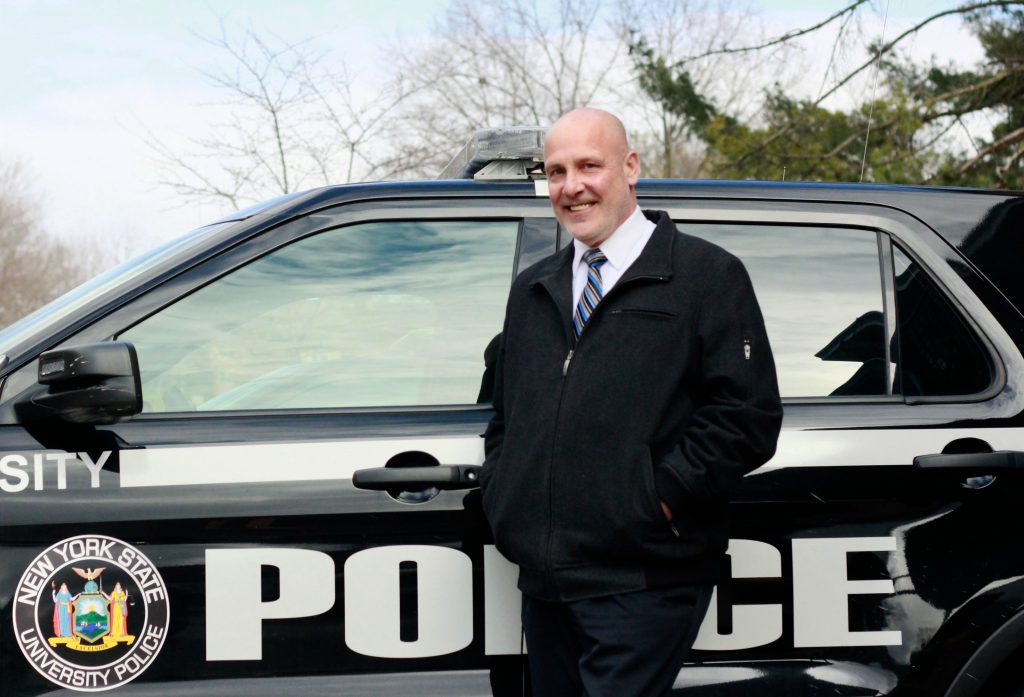
After working in Binghamton’s New York State University Police Department (UPD) for over 35 years, Chief Timothy Faughnan will be moving into an administrative role at Binghamton University, and a new chief will be coming to campus.
The University has formed a search committee to find a replacement for Faughnan, composed of administrators, emergency management staff, faculty and a student representative. Brian Rose, vice president of student affairs, will chair the committee. Faughnan will serve as chief until his replacement is found.
“The search committee will begin review of applicants in the next week, but there is no timetable for the search,” Rose wrote in an email. “We will work until we can confidently recommend multiple qualified candidates [for] final consideration.”
Once the vacancy is filled, Faughnan will begin his new job as associate vice president for emergency services, a new position that is tasked with overseeing emergency management services on campus and forming working relationships with outside agencies, such as the Binghamton Police Department and Vestal Fire Department.
“One of the things I’m doing in my new role is looking at how we create synergy between these different emergency service departments,” Faughnan said. “We all have red lights, so where can we better share training opportunities and bring everyone under one umbrella? Additionally, we’ve been in Vestal forever, but we’re moving into Johnson City and Binghamton now, and I’m helping to establish those relationships as well.”
During his time at UPD, Faughnan has focused on promoting community policing, a term that refers to officers using proactive, localized strategies to solve problems as they arise. To do so, he implemented the Community Response Team, a group of officers that attends events on campus and aims to interact with students, faculty and staff as much as possible. He said he hopes his replacement will continue his work.
“Community policing is not a program,” Faughnan said. ”It is a way of doing our jobs and policing our community, and it can be different than the way other places police. [The Community Response Team] gets out there, into the community, and anything that is going on, they show up. They try to interact with the community. It’s worked out so well, and I’ve actually been contacted by a number of colleges and universities about this, as well as several college towns.”
The University’s job post for the position says candidates should have a minimum of 10 years of experience in law enforcement, including at least two years of experience in a supervisory role. Additionally, candidates must possess knowledge of police procedures and equipment, strong communication skills and familiarity with state and local laws, ordinances and regulations.
“The successful candidate must demonstrate cultural competency including awareness and appreciation of the cultural diversity of the University and surrounding community and a commitment to developing a diverse and culturally competent workforce,” the post read. “Of equal importance is the lead role the chief of police takes on behalf of the department to build a collegial relationship with those that comprise the University community, its students, faculty and staff.”
Faughnan said the new chief will face several challenges, from establishing their leadership and forming relationships around campus to addressing student concerns about fair policing and discrimination.
“The challenges for the department as a whole [are] the constant changes in society,” Faughnan said. “It’s issues like race and gender, which are critically important to what we do as police. We need to think about how we implement appropriate policing for this community, and we need to be part of those discussions and be good listeners. These are huge challenges.”
Nevertheless, Faughnan said he is confident the change in leadership will be beneficial for the department and community, and he will be there to guide the new chief as they settle into the role.
“I’m looking for someone who is going to pick up where I left off and do their own great things,” Faughnan said.


